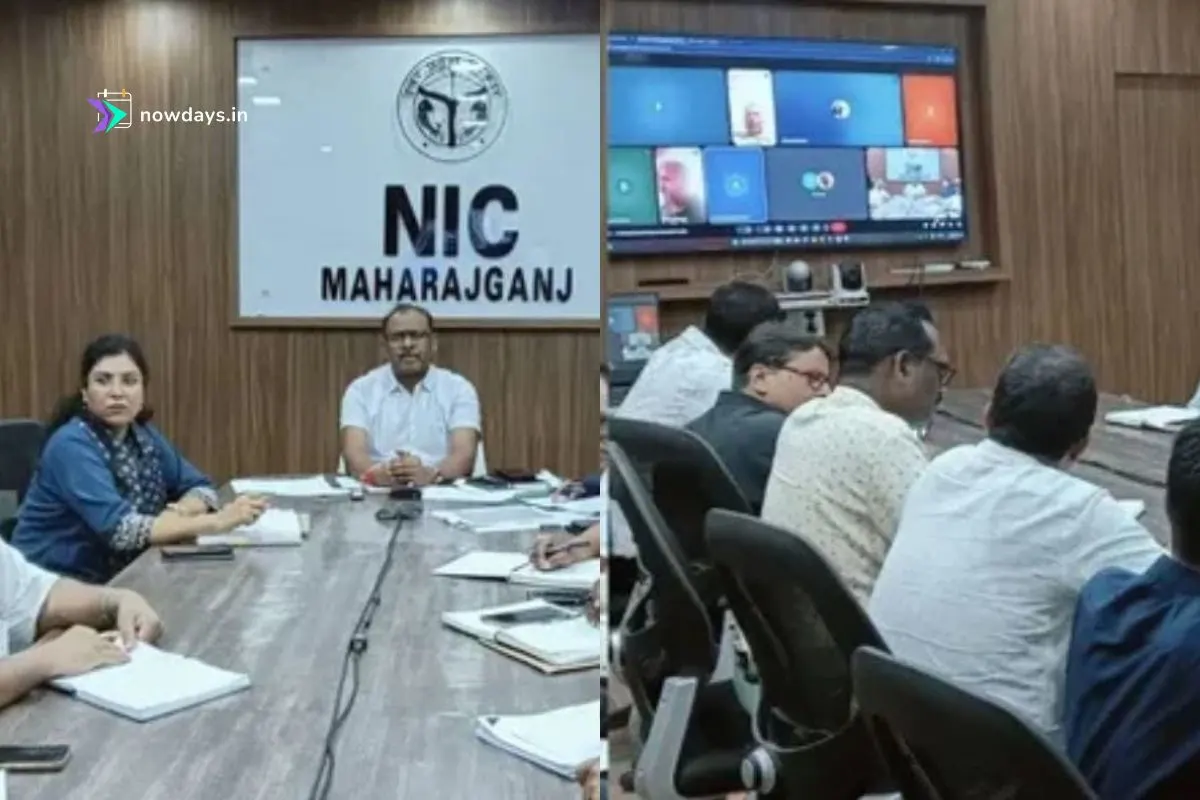In a shocking disruption to an official online gathering, a pornographic video was unexpectedly broadcast during a virtual education department meeting chaired by the Maharajganj District Magistrate in Uttar Pradesh, prompting an immediate exit by participants and sparking a cybercrime investigation. The incident, which unfolded on August 7, 2025, has raised serious questions about digital security in public administrative sessions and the vulnerabilities of online platforms.
The Incident: What Went Wrong
The meeting, conducted via an e-Chaupal platform, was intended to address school-related concerns directly with the public. Attended by District Magistrate Santosh Kumar Sharma, the basic education officer, block-level education officials, headmasters, government teachers, and community members, the session aimed to foster open dialogue on improving educational standards. However, midway through, a participant identified as “Jason Junior” activated screen-sharing and played explicit content, causing widespread embarrassment. Compounding the chaos, another attendee named “Arjun” allegedly directed inappropriate comments at the group.
During a high-level meeting in Uttar Pradesh’s Maharajganj district to discuss "How to raise the level of education?", an embarrassing incident occurred involving the District Magistrate, senior officials, teachers, and a female Basic Shiksha Adhikari (BSA)#upnews #Maharajganj pic.twitter.com/YaSccPxKub
— Deepak Soni (@__deepaksoni) August 12, 2025
Officials quickly terminated the session to halt the breach, but not before it affected the proceedings. Sources indicate that the platform’s open-access nature, designed to encourage public participation, may have allowed unauthorized users to join without stringent verification.
Immediate Response and Legal Action
Following the event, authorities acted swiftly. On August 9, a formal complaint was lodged at the Kotwali police station by the block education officer from Farenda, under instructions from the basic education officer. The FIR targets two unidentified individuals, charging them with obstructing public servants, intentional insult, and distributing sexually explicit material electronically. Police have enlisted cyber experts to trace the perpetrators using digital forensics.
District administration officials described the act as a deliberate sabotage and a cyber offense, vowing to implement stricter protocols for future virtual meetings to prevent recurrence. The DM’s office emphasized maintaining the sanctity of administrative discussions, signaling potential upgrades to platform security.
Broader Implications for Online Governance
This episode highlights the growing risks associated with digital tools in public administration, especially in sensitive sectors like education. Cybersecurity analysts point out that open platforms like Zoom or similar apps are prone to “Zoombombing,” where intruders exploit weak controls to insert disruptive content. A YouTube video analysis of similar incidents in educational settings notes that inadequate participant screening and real-time moderation often lead to such breaches, recommending multi-factor authentication and host-only screen sharing.
Education experts argue that these disruptions undermine efforts to make governance more inclusive. “When public meetings are hijacked, it erodes trust in digital initiatives meant to bridge gaps between officials and citizens,” said a policy researcher in a Hindustan Times report on virtual meeting vulnerabilities. In Uttar Pradesh, where e-governance is being pushed to enhance transparency, this incident could slow adoption if not addressed robustly.
Expert Reactions: Calls for Better Safeguards
Reactions from experts underscore the need for systemic changes. Digital rights advocates, in discussions on platforms like The Tribune, stress that while technology enables wider participation, it also exposes users—especially in mixed-gender, professional settings—to harassment. “This isn’t just a technical glitch; it’s a form of cyber harassment that demands swift legal recourse,” noted a cybersecurity consultant in a Free Press Journal commentary.
On social media and YouTube, educators have expressed outrage, with one viral video labeling it a “mockery of the education system” and urging mandatory training for officials on secure online conduct. Policy think tanks recommend integrating AI-based monitoring tools to detect and block inappropriate content in real-time, drawing from successful models in corporate virtual events.
Analyzing the Fallout and Path Forward
The Maharajganj mishap could have lasting effects on public confidence in online administrative processes. With Uttar Pradesh emphasizing digital education reforms, such incidents risk deterring participation, particularly from rural stakeholders. Experts warn that without enhanced encryption, participant verification, and rapid response mechanisms, similar breaches could proliferate, affecting not just education but other sectors like health and governance.
In response, authorities are exploring stricter guidelines, including pre-registration for attendees and dedicated IT support during sessions. As the investigation progresses, this event serves as a stark reminder of the double-edged nature of digital tools—offering convenience but demanding vigilance to protect integrity and safety.








